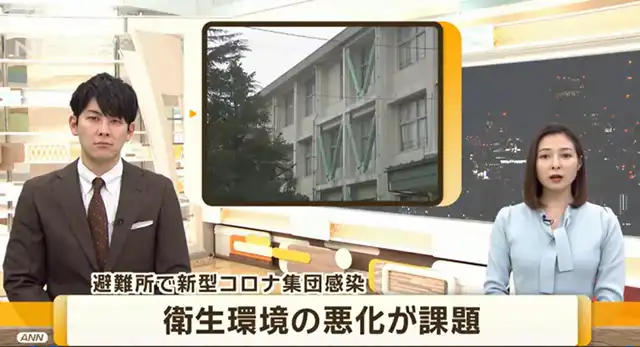Japan Earthquake: Evacuation Centers Face COVID Clusters and Hygiene Issues
- Normal Liver Cells Found to Promote Cancer Metastasis to the Liver
- Nearly 80% Complete Remission: Breakthrough in ADC Anti-Tumor Treatment
- Vaccination Against Common Diseases May Prevent Dementia!
- New Alzheimer’s Disease (AD) Diagnosis and Staging Criteria
- Breakthrough in Alzheimer’s Disease: New Nasal Spray Halts Cognitive Decline by Targeting Toxic Protein
- Can the Tap Water at the Paris Olympics be Drunk Directly?
Japan Earthquake: Evacuation Centers Face COVID Clusters and Hygiene Issues
- Should China be held legally responsible for the US’s $18 trillion COVID losses?
- CT Radiation Exposure Linked to Blood Cancer in Children and Adolescents
- FDA has mandated a top-level black box warning for all marketed CAR-T therapies
- Can people with high blood pressure eat peanuts?
- What is the difference between dopamine and dobutamine?
- How long can the patient live after heart stent surgery?
Japan Earthquake: Evacuation Centers Face COVID Clusters and Hygiene Issues
Cluster Infections of New Coronavirus in Evacuation Centers Raise Concerns about Worsening Hygiene Conditions.
In disaster-stricken areas, the deterioration of hygiene conditions during prolonged evacuation life, including cluster infections of the new coronavirus, has become a significant concern.
In an evacuation center set up at an elementary school in Nada Town, Ishikawa Prefecture, seven individuals who sought refuge in the same classroom have been collectively infected with the new coronavirus.

screenshot from tv-asahi
The town has decided to close this evacuation center and has opened two new centers at different locations, requesting approximately 20 evacuees from another classroom to relocate.
Additionally, a clinic in Wajima City has started prescribing medication for regular patients. However, as of the 6th, water supply has been cut off, and there is no prospect of resuming normal medical treatment and care.
Dr. Akira Namikata, Wajima Clinic
“Although we usually perform procedures like minor incisions and sutures in orthopedics, we cannot do such treatments at all due to the lack of proper hygiene.”
While the installation of temporary toilets in evacuation centers is gradually progressing, there is insufficient access to clean water. People in evacuation are facing a situation where handwashing and bathing are not possible.
In an environment where hygiene conditions have worsened, there is a tendency for infectious diseases to increase within about a week, posing a significant challenge for the disaster-stricken area.
Rising Infectious Disease Risks in Disaster Areas – Dispatched Doctors Raise Concerns in the Aftermath of the Noto Peninsula Earthquake
Dr. Shoji Yokobori (second from the right), who interviewed local government officials about medical conditions and measures, on the 3rd in Noto Town, Ishikawa Prefecture. (Provided by Dr. Yokobori)
In the aftermath of the Noto Peninsula earthquake, which recorded a maximum seismic intensity of 7, doctors dispatched to evacuation centers in disaster-stricken areas shared their insights through interviews conducted until the 6th.
Due to difficulties in hygiene management caused by water shortages and other factors, there is a growing risk of the spread of infectious diseases such as the novel coronavirus. Dr. Shoji Yokobori, a professor at the Nippon Medical School, emphasized the urgent need for prompt action.
Dr. Yokobori, who participated in disaster medical support activities as a member of the All Japan Hospital Disaster Medical Assistance Team (AMAT), worked alongside nurses in providing support. In Noto Town, Ishikawa Prefecture, where approximately 4,000 people were evacuated, there was only one doctor in the first 48 hours after the disaster. At the evacuation center set up at Ogaki Junior High School, where Dr. Yokobori was dispatched, evacuees relied on flashlight illumination for their daily lives. Reflecting on the local situation, he stated, “There is no water, limited food, no electricity. They are cut off both mentally and materially.”
Many evacuees presented symptoms such as fever, cough, and diarrhea during examinations, leading to the administration of antipyretics and the isolation of individuals in classrooms. However, the shortage of heating equipment limits the effectiveness of isolating in classrooms.
Concerns were raised about the lack of water for handwashing and the inability to bathe for an extended period due to the impact of water shortages. With insufficient supplies, it is challenging to enforce preventive measures such as the use of disinfectant alcohol and masks, sounding an alarm for the potential spread of influenza and novel coronavirus.
Dr. Yokobori emphasized, “The risk of heart attacks and pulmonary embolisms will also increase from now on. To eliminate disaster-related deaths, not only pharmaceuticals but also human support is necessary.”
References:
https://news.tv-asahi.co.jp/news_society/articles/000331459.html
https://news.yahoo.co.jp/articles/f8b0c0cdeee284c8d6250c220d96cc6cccb8e03b
(source:internet, reference only)
Disclaimer of medicaltrend.org
Important Note: The information provided is for informational purposes only and should not be considered as medical advice.



